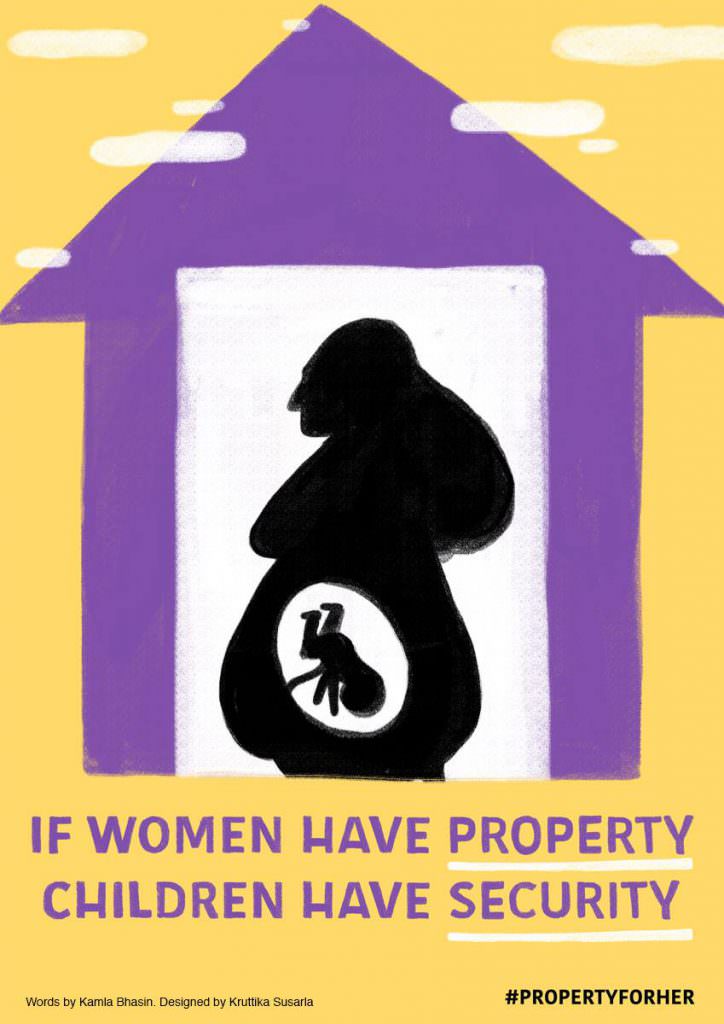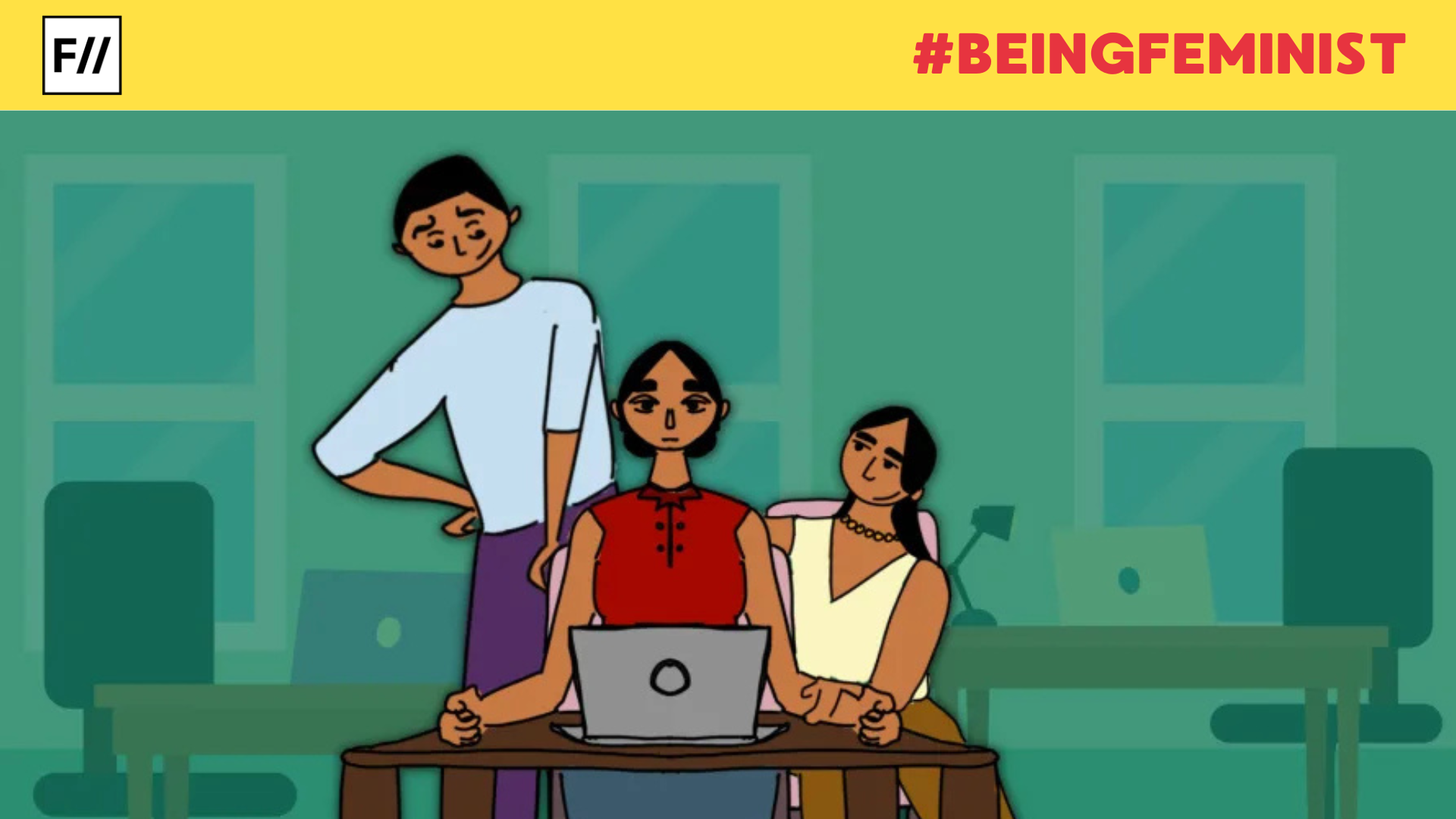A multi-organisation campaign #PropertyForHer was recently launched on social media in India with an aim to secure equal property rights for women across South Asia. The campaign appeals to parents and brothers to support their daughters’ and sisters’ right to property and encourages women to demand their equal share in the property.
The campaign also has a petition on Change.org, launched by Arti Pandey, Co-Founder and Secretary of Bitiya.
The campaign was initiated by activist Kamla Bhasin, who learned in a conversation with a journalist of NDTV, Radhika Bordia, that the latter couldn’t find one woman in Delhi who was ready to say she hadn’t received her share of her family’s property on camera. This brought to Bhasin’s attention how women in India had internalised patriarchal norms even when it came to property rights, with the notion that ‘good women don’t ask for property’ widely prevalent. Hence, the #PropertyForHer campaign was launched to bring this issue into public consciousness and to fill the gaps law and socio-cultural norms around women’s property rights.
Inheritance is the most common means of acquiring property in India and the laws governing it varies according to different religions. As per the Muslim Personal Law, women were given the right to property since 1937, however, their share was only half of their brothers’ share. There were several gender-based discrepancies in Hindu Succession Act of 1956, which applied to about 80% of India’s population. For instance, agricultural land was exempted from the law, daughters weren’t coparceners to joint family property and didn’t have residence rights to their maternal home after getting married. This was changed with the Hindu Succession Amendment Act of 2005.
However, the mere existence of laws doesn’t ensure their proper implementation. Women have a limited command over property. According to the 2011 census, the number of women “cultivators” is about 3.59 crores. Agricultural Census 2010-11, on the other hand, captures female “operational holdings” at about 1.76 crores, that is only 12.69% of rural women. Even the size of their land holdings is estimated to be half the size of men’s land holdings. A 2002 study Are We Not Peasants too? by Bina Agarwal estimated that, across India, 87% of women did not receive their legal due as daughters. In the case of widows, it was found that only 51% inherited land from their deceased husband.
A study conducted in Kerala found that 49% of property-less women reported long-term physical violence in their relationships, compared with 18% and 10% respectively of those who owned either land or house and 7% if they owned both. The same study found that ownership of immovable property reduced the risk of violence more than even employment and education.
This can be attributed to the reason many women cite for why they couldn’t leave an abusive relationship – not having a fall-back position to provide them safety. Women having an independent access to and control of ownership of land and property reduces gender-based violence, a risk of poverty and destitution and helps challenge the discriminatory power relationships at home. It has also been proven that child welfare improves drastically when mothers have independent economic assets. Women’s property rights are critical not only for her wellbeing but also for the betterment of society.

Children with mothers who have independent economic resources are much less vulnerable to poverty. In rural areas, children are more likely to attend school and receive medical attention if the mother has more independent assets. Via #PropertyForHer’s Facebook page
And since the socio-cultural norms still remain a major barrier to women’s asset ownership, the #PropertyForHer campaign was launched with the involvement of several diverse organisations to bridge the gaps and attend to various aspects influencing the issue separately. This collaborative campaign was launched after intensive discussions done at the two-day #PropertyFor Her seminar which was attended by 61 people from 37 organisations, networks, unions, and groups across India. The seminar saw representation from academicians, activists, lawyers and media persons to ensure #PropertyForHer is created as an all-encompassing campaign.
The several organisations and institutions involved with the #PropertyForHer campaign now plan to incorporate the issue of women’s property rights in their existing work. Different organisations have chosen to work on different aspects concerning the issue, for instance, some have proposed to work for a change in policy around affordable housing for single women by engaging the policy makers on the issue. Some decided to focus on the dissemination of the ideas through online campaigns, petitions, pledges and articles. The campaign also organised a Tweet-a-thon on July 5, 2017, which saw scores of men and women sharing their views on the issue.
As ideal parents we should ensure our daughters have equal share of our property. #PropertyForHer pic.twitter.com/Lg8UYJGH0C
— Saroj Pattnaik (@sarojskp) July 5, 2017
The main focus of the campaign, however, would still be to address the discriminatory attitudes around women’s right to property. It would focus on women’s command over property instead of simply securing formal ownership. The campaign is founded on the notion that efforts to secure women’s ownership of property should go hand-in-hand with the efforts to secure their effective control over that property. One way the campaign aims to achieve this is by engaging men as allies and creating awareness amongst them of the long-term benefits of women’s asset ownership. The idea of women owning property threatens the patriarchal role of men as the providers. #PropertyForHer campaign wants to change the perspective of women being seen as encroachers for accessing their property rights to it being seen as women simply sharing in the responsibility.
Featured Image Credit: #PropertyForHer’s Facebook page
About the author(s)
Shagun Gupta is a fiction enthusiast and an amateur photographer, currently embarking on a writing career after having recently earned her post-graduate degree in Mass Communication.





A timely article. You would be surprised to know that even courts are against woman. I am litigating for my rights to property since 1994 and still there is no hope.